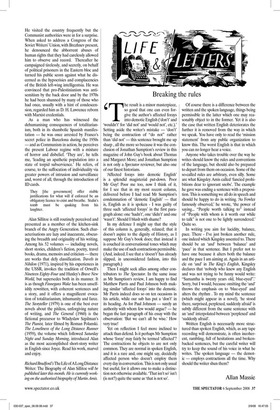Breaking the rules
‘The result is a minor masterpiece, so good that one can even forgive the author’s affected forays into demotic English (‘don’t’ and ‘wouldn’t’ for ‘did not’ and ‘would not’, etc.).’ Setting aside the writer’s mistake — ‘don’t’ being the contraction of “do not” rather than ‘did not’ — this sentence brought me up sharp , all the more so because it was the conclusion of Jonathan Sumption’s review in this magazine of John Guy’s book about Thomas and Margaret More; and Jonathan Sumption is not only a Spectator reviewer, but also one of our finest historians.
‘Affected forays into demotic English’ is a splendid magisterial put-down. Poor Mr Guy! Poor me too, now I think of it, for I see that in my most recent column, delivered before I had read Mr Sumption’s condemnation of ‘demotic English’ — that is, English as it is spoken I was guilty of three such ‘affected forays’ in the first paragraph alone: one ‘hadn’t’, one ‘didn’t’ and one ‘wasn’t’. Should I blush with shame?
In my defence I might say that the style of this column is, generally, relaxed; that it doesn’t aspire to the dignity of History, as I suppose Mr Guy’s book does; that instead it is couched in conversational tones which may make the use of such contractions permissible. (And, indeed, I see that a ‘doesn’t’ has already slipped, in unconsidered fashion, into this paragraph.) Then I might seek allies among other contributors to The Spectator. In the same issue as Mr Sumption‘s review, I am happy to find Matthew Parris and Paul Johnson both making similar ‘affected forays’ into the demotic. Mr Parris indeed does so on ten occasions in his article, while our sub has put a ‘don’t’ in its heading. As for Paul Johnson — surely an authority with whom few would argue? — he began the last paragraph of his essay with the observation: ‘But we can’t all be wise.’ How very true!
Yet on reflection I feel more inclined to attack than defend. Is it perhaps Mr Sumption whose ‘foray’ may fairly be termed ‘affected’? The contractions he objects to are not only common. They are normal in spoken English, and it is a rare and, one might say, decidedly affected person who doesn’t employ them every day in conversation. This is not only usual but useful, for it allows one to make a distinction not otherwise available. ‘That isn’t so’ isn’t (is not?) quite the same as ‘that is not so’. Of course there is a difference between the written and the spoken language, things being permissible in the latter which one may reasonably object to in the former. Yet it is also the case that written English deteriorates the further it is removed from the way in which we speak. You have only to read the ‘mission statement’ from any public organization to know this. The worst English is that in which you can no longer hear a voice.
Anyone who takes trouble over the way he writes should know the rules and conventions of the language, but should also be prepared to depart from them on occasion. Some of the so-called rules are arbitrary, even silly. Some are what Kingsley Amis called ‘fancied prohibitions dear to ignorant snobs’. The example he gave was ending a sentence with a preposition. This is something we all do in speech and should be happy to do in writing. ‘As Fowler famously observed,’ he wrote, ‘the power of saying... “People worth talking to” instead of “People with whom is it worth our while to talk” is not one to be lightly surrendered.’ Quite so.
In writing you aim for lucidity, balance, pace. There I’ve just broken another rule, one indeed which Kingsley assented to. There should be an ‘and’ between ‘balance’ and ‘pace’ in that sentence. But I prefer not to have one because it alters both the balance and the pace I am aiming at. Again in an article on ‘and’ in The King’s English, Kingsley declares that ‘nobody who knew any English and was not trying to be funny would write: “Samantha is twenty years old, blue-eyed”.’ Sorry, but I would, because omitting the ‘and’ throws the emphasis on to ‘blue-eyed’ and alters the rhythm . To my mind the sentence (which might appear in a novel), ‘he stood there, surprised, perplexed, suddenly afraid’ is subtly different from the same sentence with an ‘and’ interpolated between ‘perplexed’ and ‘suddenly afraid’.
Written English is necessarily more structured than spoken English, which, as any tape recording will demonstrate, is often incoherent, rambling, full of hesitations and brokenbacked sentences, but the careful writer will try to keep the sound of his voice in what he writes. The spoken language — the demotic — employs contractions all the time. Why should the writer shun them?
Allan Massie


































































 Previous page
Previous page